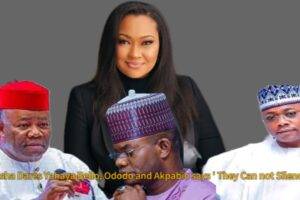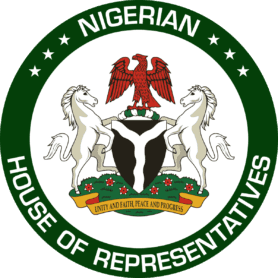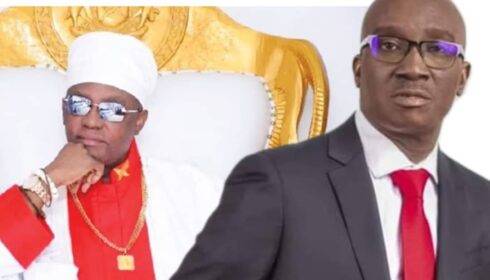A new bill has been introduced in the House of Representatives to expand the legislative body’s membership from 360 to 366 seats. This legislative proposal, which seeks to amend Section 49 of the 1999 Constitution of the Federal Republic of Nigeria (as amended), aims to reserve six seats specifically for women and individuals with disabilities. The bill, titled “Constitution of the Federal Republic of Nigeria, 1999 (Sixth Alteration) (Six Special Seats for Special Interest Groups) Bill, 2024 (HB.1811),” made its initial appearance for reading during Wednesday’s plenary session.
The bill was presented by Akintunde Rotimi, the House Spokesman and a representative from Ekiti under the APC. According to Rotimi, the proposed amendment will help improve diversity and inclusion within the Nigerian legislative system by granting representation to traditionally underrepresented groups. This initiative marks a significant shift toward a more inclusive legislative structure in Nigeria, underscoring the government’s commitment to increasing political participation among marginalized communities.
House of Representatives Proposed Bill Seeks Special Seats for Women and Persons with Disabilities
At the core of this legislative proposal is the creation of six reserved seats for women and persons with disabilities (PWDs) in the House of Representatives. Currently, the House of Representatives operates with 360 seats, filled by representatives from various constituencies across Nigeria. The proposed bill aims to alter this structure by adding six additional seats that would be specifically allocated to individuals from these underrepresented groups, in an effort to enhance diversity in legislative decision-making.
This proposal emerges amid calls from advocacy groups and civil society organizations for greater representation of women and people with disabilities in government. Proponents argue that such a change would empower these groups, ensuring that their unique perspectives and challenges are directly addressed in national policy. The bill is seen as a progressive step toward equity and inclusivity, allowing the voices of marginalized communities to have a stronger presence within the country’s legislative process.
House of Representatives Spokesman Akintunde Rotimi Leads Effort for Constitutional Amendment
House of Representatives Spokesman Akintunde Rotimi, representing Ekiti under the APC, has been the driving force behind this constitutional amendment. By sponsoring this bill, Rotimi has positioned himself as an advocate for inclusivity and political empowerment for women and PWDs. During the plenary session, Rotimi emphasized that the legislation aims to correct longstanding disparities in political representation by bringing diverse perspectives to the forefront of national discourse.
Rotimi further explained that the bill aligns with Nigeria’s democratic principles and international commitments to ensure equal rights and opportunities for all citizens. He highlighted the need for a political system that reflects the diversity of Nigeria’s population, arguing that an inclusive House would be more responsive to the needs of its citizens. The proposal demonstrates the APC’s commitment to driving transformative policies that promote equity and fair representation.
Potential Impact of Reserved Seats on Nigerian Legislative Landscape
If passed, the amendment to create six reserved seats in the House of Representatives is expected to have a profound impact on the legislative landscape in Nigeria. It will set a precedent for greater inclusivity, allowing individuals from marginalized backgrounds to participate actively in decision-making processes that shape the nation’s future. Such representation could lead to policies that better address the needs and concerns of women and PWDs, fostering a more equitable society.
Increased representation of women and PWDs in government is anticipated to bring new perspectives to policy discussions. Advocates believe that this change will lead to the development of more comprehensive policies, especially in areas like healthcare, education, and social welfare, where the voices of women and people with disabilities are often underrepresented. The reserved seats could empower these groups to advocate for inclusive reforms that address structural inequalities in Nigerian society.
Public Reaction and Support from Civil Society Organizations
The proposal to reserve special seats for women and persons with disabilities has garnered widespread support from civil society organizations, human rights groups, and gender equality advocates. Many of these groups see the bill as a landmark development in promoting gender parity and disability inclusion within Nigeria’s political sphere. Activists argue that such a constitutional amendment is overdue, given the country’s obligations under international agreements, including the United Nations Convention on the Rights of Persons with Disabilities and the African Union’s Protocol on Women’s Rights.
Supporters believe that increasing the representation of marginalized groups in the House of Representatives will help address systemic biases in Nigeria’s political and social frameworks. However, some opposition voices argue that the amendment could lead to tokenistic representation if not implemented carefully. Despite differing opinions, the bill has sparked a vital discussion about inclusion, fairness, and democracy in Nigeria’s evolving political landscape.
Next Steps and Potential Challenges for the Bill
Following its introduction, the bill will undergo a series of legislative readings, debates, and potential revisions before any vote is conducted. The path to passing constitutional amendments in Nigeria involves significant deliberation, requiring a two-thirds majority approval in both chambers of the National Assembly and assent from two-thirds of Nigeria’s 36 state assemblies. While the bill’s initial reception has been positive, it may face challenges from those resistant to expanding legislative seats and dedicating them to specific interest groups.
Legal experts and political analysts are closely watching this development, noting that the bill’s success could inspire further constitutional reforms aimed at promoting inclusivity. Should it pass, the bill would set a transformative example for other African countries seeking to increase political representation for women and people with disabilities. This legislation represents a bold step toward building a more inclusive and equitable Nigeria, laying the groundwork for future reforms that reflect the nation’s diverse demographics and values.
Table of Contents
Discover more from OGM News NG
Subscribe to get the latest posts sent to your email.














